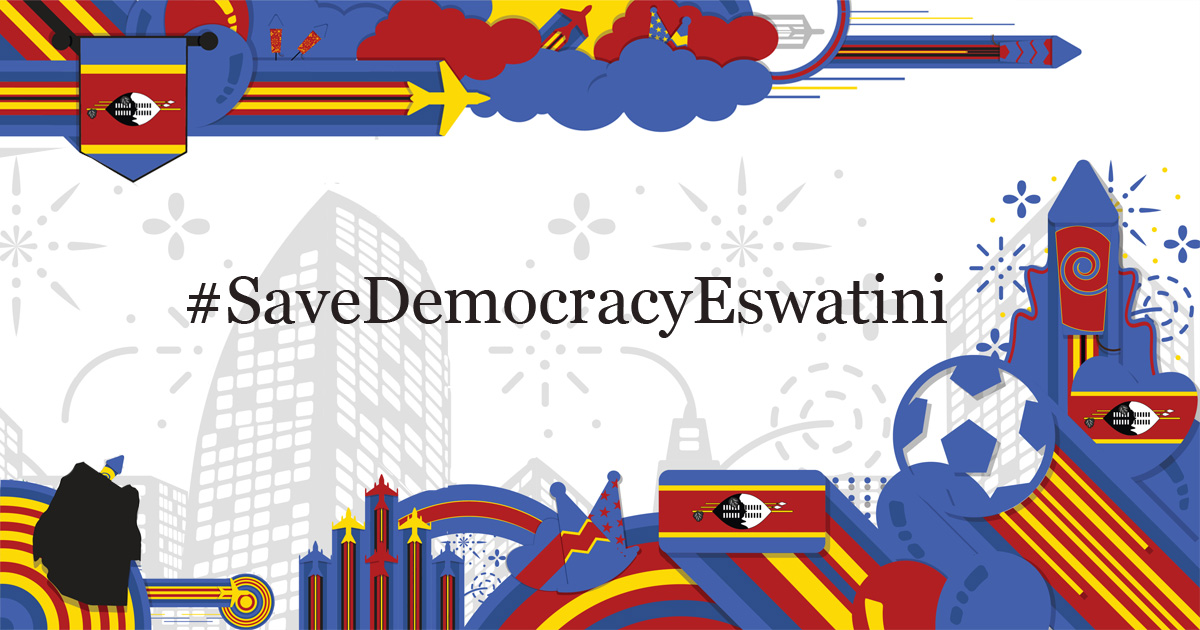1 Background: the Decree and the Constitution
- The Kingdom of Eswatini is situated in the south east of the Southern African region and surrounded on its north, west and south by the Republic of South Africa and bordered by Mozambique to the east. The Kingdom has a population of about 1,093,238 which is predominantly homogeneous, composed of ethnic Emaswati at 97.8 percent and 2.2 non – Swatis.
- After attaining independence in 1968, the political system was that of a multiparty system until the King, through Proclamation No. 01 of 1973 (1973 Decree), repealed the 1968 Constitution. The 1973 Decree expressly banished the operation of political parties and the King assumed leadership of both the executive and legislative powers until the enactment of the Constitution of the Kingdom of Eswatini Act 001 of 2005, which provides for freedom of association.
- Despite its provisions relating to its supremacy, the Constitution does not expressly abrogate the Decree and is silent on the position, operation, and effects of the 1973 Decree, which effectively means that it is still in force as the government continues to implement it. This essentially means the King is the highest authority in the land; he has the powers to veto bills and dissolve an elected parliament.
- Since the ban of political parties, political formations, civil society organisations and human rights defenders (HRDs) in the country have been rigorously challenging the legality and legitimacy of the 1973 Decree and at some point, a number of political parties were proscribed by the government. Challenging the Decree and calling for a democratic multiparty political system has led to HRDs’ reprisals by the state.
- Political parties only exist as associations of persons with similar ideas but cannot register as such because there is no process of registration. The government has argued that the constitutional clause on freedom of assembly and association does not extend to provide for political parties or their involvement in elections.
2 Are you aware of the democratic situation in Eswatini?
Here is a breakdown of what is occurring:
- The 1973 Decree banished the operation of political parties and the King assumed leadership of both the executive and legislative powers until the enactment of the Constitution of the Kingdom of Eswatini Act 001 of 2005, which provides for freedom of association. This also makes the King the highest authority in the land.
- The current system of government is a constituency (tinkhundla) that decentralises state power from central government to tinkhundla areas and individual merit as a means for election and public office appointment. As a result of this, political parties are barred from participating in elections and cannot nominate candidates contesting for elections. However, members of such parties can participate in the current system of governance for Eswatini through individual merit.
- Eswatini’s Legislature uses a bicameral system composed of the House of Assembly and the Senate. The Emaswati elect 59 Members of Parliament (MPs) into the House of Assembly on an individual basis. Four women are elected to meet the 30% Constitutional quota required by the House of Assembly (for regions where women are underrepresented)’ and an additional 10 Members of parliament are appointed by the King. The Senate comprises 10 senators elected by the MPs and 20 Senators appointed by the King. The Prime Minister is appointed by the King among the MPs from the House of Assembly.
3 Decoding democratic failure in Eswatini
- Eswatini experienced a first of its kind civil unrest in June 2021 after 3 MPs raised a motion in Parliament calling for compliance with section 67(1) of the Constitution of Eswatini, which regulates the procedure for appointment of the Prime Minister. The unrest was characterised by vandalisation of public and private infrastructure, looting in business establishments, road blockages and burning of traditional structures.
- It follows that since Prime Ministers are appointed by the King, they are not accountable to the people of Eswatini and do not serve the masses’ interest. The 3 MPs convened meetings in their respective constituencies. The outcome was that the electorate petitioned the constituencies (tinkhundla) listing a number of issues relating to poor quality of service delivery from the Government as a result of accountability issues from the Executive and the appointment of a Prime Minister not being elected by the people.
- HRDs have been spearheading the challenge on violation of the rights of the Emaswati, resulting in their arbitrary arrests and detention and denial of bail, and in grave circumstances, assassinations.
- The security forces violated fundamental human rights by use of excessive force to quell the civil unrest, and the curtailing of freedom of expression and access to information as the internet was shut down. As a result, about 245 people were treated for gunshot wounds and about 46 people lost their lives.
- After the unrest, the Minister of Housing and Urban Development banned municipal authorities or urban governments from issuing licences to institutions, entities, and individuals convening a public gathering.
- The actions of the Eswatini government violated several human rights enshrined in Eswatini’s Constitution as well as the African Charter on Human and Peoples’ Rights (ACHPR) and the International Covenant on Civil and Political Rights (ICCPR) which Eswatini ratified.
- The right to life (Article 6 ICCPR; Article 4 ACHPR)
- The right of peaceful assembly (Article 21 ICCPR & Article 11 ACHPR)
- The right to freedom of association (Article 22 ICCPR & Article 10 ACHPR)
- The right to receive information and freedom of expression (Article 19 ICCPR & Article 9 ACHPR)
- The right to liberty and security of persons (Article 9 ICCPR; Article 6 ACHPR)
- The right to participate freely in the government (Article 25 ICCPR & Article 13 ACHPR)
- Freedom against torture, inhumane or degrading treatment or punishment (Article 7 ICCPR; Article 5 ACHPR)
4 The Centre for Human Rights calls
- The Centre for Human Rights (CHR), Faculty of Law, University of Pretoria is concerned with the gross and systemic human rights violations targeted at HRDs, political activists, and civil society actors because of calls for greater reforms in Eswatini’s political governance system.
- In letters sent to the Prime Minister, the President of the Senate, and the Speaker of the House of Assembly of Eswatini; the African Commission on Human and Peoples’ Rights; the Pan African Parliament and the SADC Secretariat, the CHR calls on them to address and intervene in the human rights and democracy crisis in Eswatini.
- The CHR is particularly concerned about the situation of pervasive human rights, which saw the brutal assassination of renowned lawyer and human rights defender, Thulani Maseko, the CHR’s alumnus, class of 2005 and Vera Chirwa Prize Award 2011.
- Before Thulani’s assassination on 21 January 2023, Eswatini’s failure to effectively respond to the needs of its citizens led to civil unrest in June 2021. The civil unrest was precipitated by the repressive measures of the government to silence people desperately calling for multiparty democracy. In response, the government unleashed riot police, who violently meted out violence on the people who were genuinely exercising their right to freely protest and demonstrate. As a result, an estimated 46 people died, 245 were heavily wounded, and 337 were arrested. In addition to these human rights violations, two members of parliament were arrested under trumped-up charges relating to terrorism and they have remained in custody awaiting their trial. Another political activist was doused with petrol and set alight in the face by state security agents at a roadside checkpoint.
- In light of the egregious human rights violations and democracy deficit in Eswatini, the CHR calls on civil society organisations to continue their efforts to document the violations and lobby the government to desist from violating the freedoms set out in the Eswatini Constitution and in treaties to which the country is a party, and pursue justice for the victims.
- The CHR also calls on the Pan African Parliament and the African Commission on Human and Peoples’ Rights to conduct investigations to establish the human rights violations taking place and issue recommendations, reminding the state of its obligations to protect, promote, respect and fulfil human rights.
- The CHR further calls on Eswatini to ensure that independent investigations of the human rights violations from 2021 to 2023 are conducted and the perpetrators held accountable. The Kingdom of Eswatini must cooperate with civil society, regional human rights mechanisms and the people of Eswatini in facilitating political dialogue before the September 2023 elections.
SaveEswatiniDemocracy, an advocacy campaign by the Human Rights and Democratisation in Africa (HRDA) Class 2023 namely: CHIKOMBA Idirashe Amanda, CHITHOPE-MWALE Chimwemwe, GREENE. O Jonette-Ann Matilda, KANHIYA Lakshita, KASONDE Kafula, KITHEMBE Ilse Syonthi, MOYO Daniel Thamsanqa, MSOMI Zaharah Nosisekelo, MUROPA Makomborero Carl and NSIBANDZE Mlondi.
For more information, please contact:



